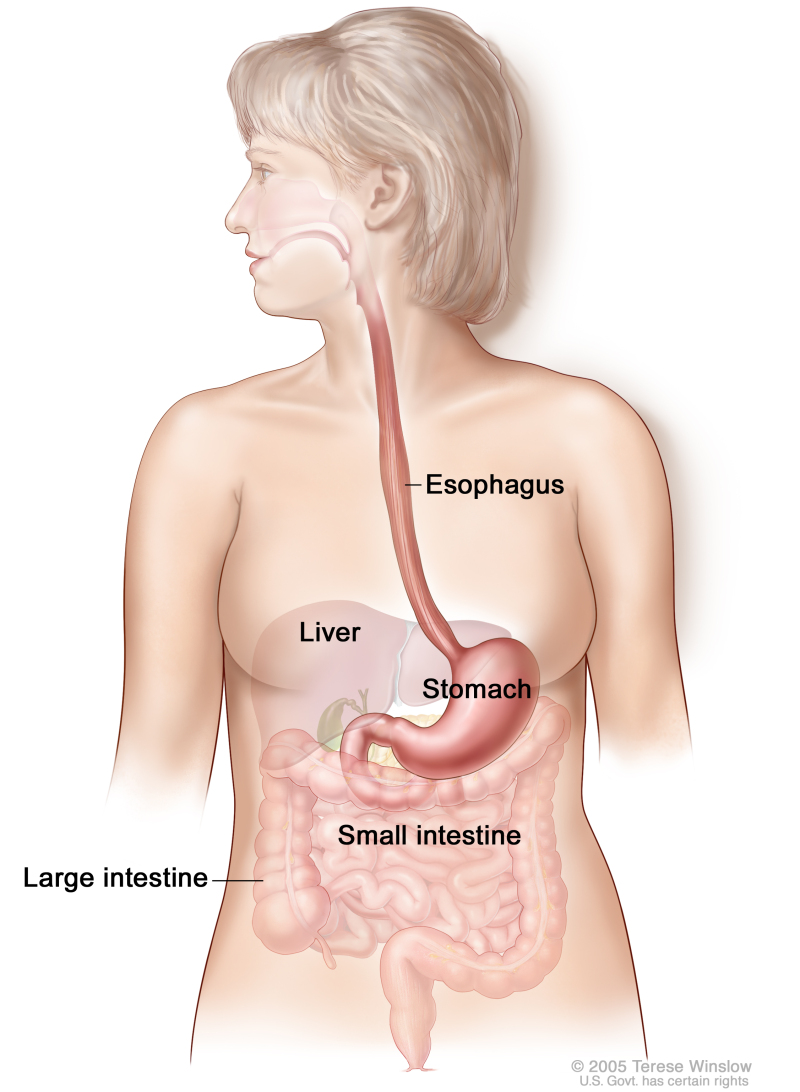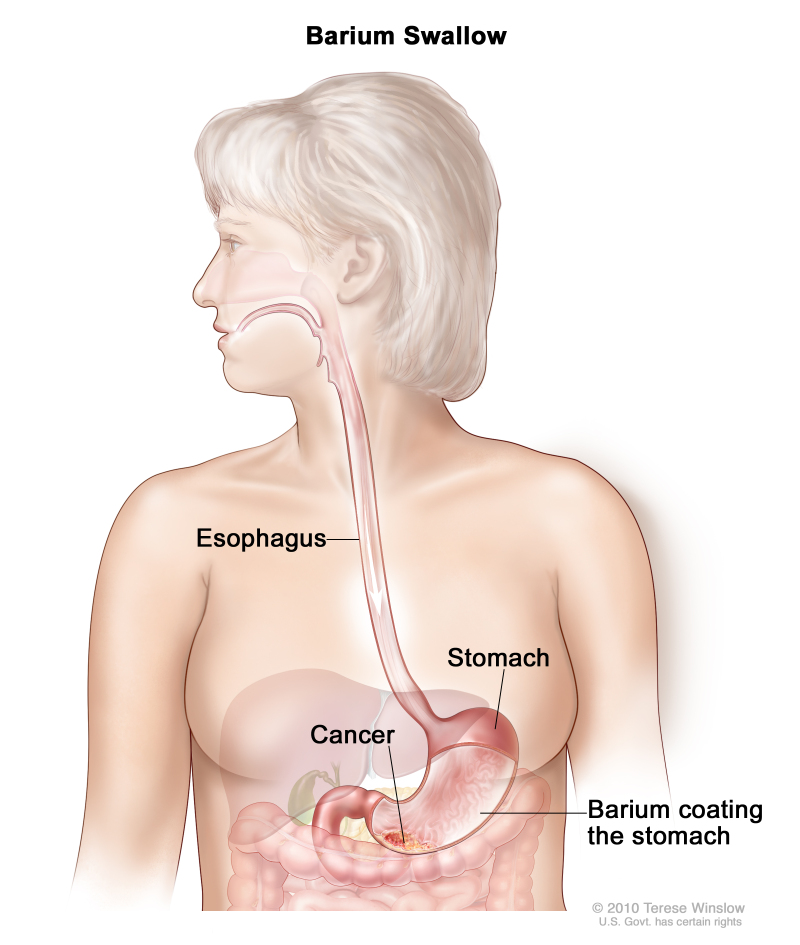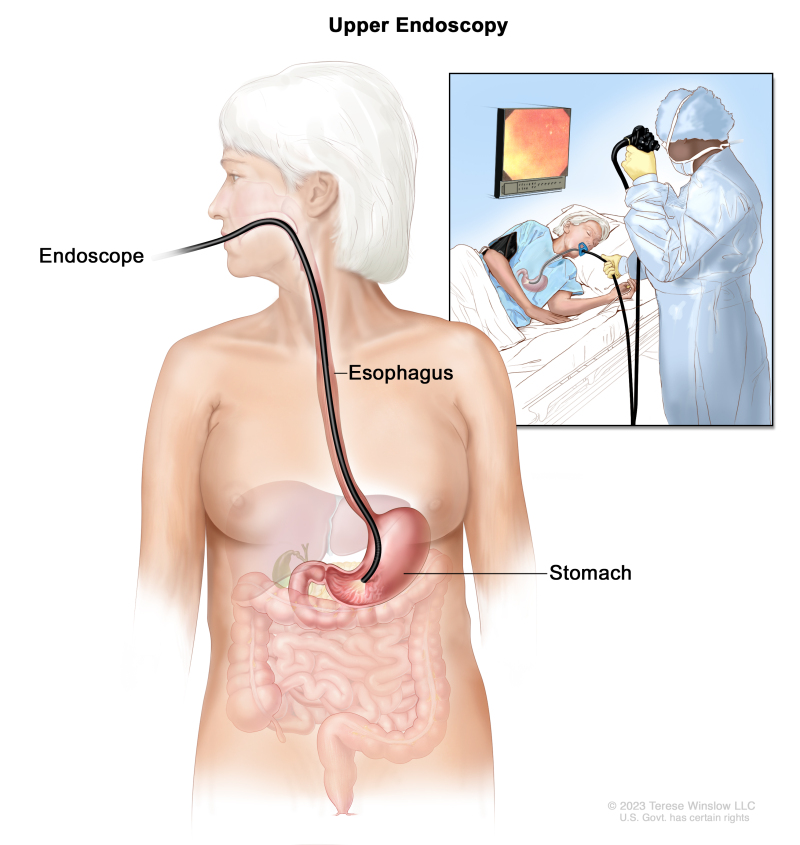NCBI Bookshelf. A service of the National Library of Medicine, National Institutes of Health.
PDQ Cancer Information Summaries [Internet]. Bethesda (MD): National Cancer Institute (US); 2002-.

PDQ Cancer Information Summaries [Internet].
Show detailsThis PDQ cancer information summary has current information about stomach (gastric) cancer screening. It is meant to inform and help patients, families, and caregivers. It does not give formal guidelines or recommendations for making decisions about health care.
Editorial Boards write the PDQ cancer information summaries and keep them up to date. These Boards are made up of experts in cancer treatment and other specialties related to cancer. The summaries are reviewed regularly and changes are made when there is new information. The date on each summary ("Date Last Modified") is the date of the most recent change. The information in this patient summary was taken from the health professional version, which is reviewed regularly and updated as needed, by the PDQ Screening and Prevention Editorial Board.
What is screening?
Screening is looking for cancer before a person has any symptoms. This can help find cancer at an early stage. When abnormal tissue or cancer is found early, it may be easier to treat. By the time symptoms appear, cancer may have begun to spread.
Scientists are trying to better understand which people are more likely to get certain types of cancer. They also study the things we do and the things around us to see if they cause cancer. This information helps doctors recommend who should be screened for cancer, which screening tests should be used, and how often the tests should be done.
It is important to remember that your doctor does not necessarily think you have cancer if he or she suggests a screening test. Screening tests are given when you have no cancer symptoms.
If a screening test result is abnormal, you may need to have more tests done to find out if you have cancer. These are called diagnostic tests.
General Information About Stomach (Gastric) Cancer
Key Points for This Section
Stomach cancer is a disease in which malignant (cancer) cells form in the lining of the stomach.
The stomach is a J-shaped organ in the upper abdomen. It is part of the digestive system, which processes nutrients (vitamins, minerals, carbohydrates, fats, proteins, and water) in foods that are eaten and helps pass waste material out of the body. Food moves from the throat to the stomach through a hollow, muscular tube called the esophagus. After leaving the stomach, partly-digested food passes into the small intestine and then into the large intestine.
The wall of the stomach is made up of 3 layers of tissue: the mucosal (innermost) layer, the muscularis (middle) layer, and the serosal (outermost) layer. Stomach cancer begins in the cells lining the mucosal layer and spreads through the outer layers as it grows.
See the following for more information about stomach cancer:
Stomach cancer is not common in the United States.
Stomach cancer is less common in the United States than in many parts of Asia, Europe, and Central and South America. Stomach cancer is a major cause of death in these parts of the world.
In the United States, the number of new cases of stomach cancer has greatly decreased since 1930. The reasons for this are not clear, but may have to do with better food storage and changes in the diet, such as lower salt intake.
Older age and certain chronic conditions increase the risk of stomach cancer.
Anything that increases the chance of getting a disease is called a risk factor. Having a risk factor does not mean that you will get cancer; not having risk factors doesn't mean that you will not get cancer. Talk to your doctor if you think you may be at risk for stomach cancer. Risk factors for stomach cancer include the following:
- Having any of the following medical conditions:
- -
Helicobacter pylori (H. pylori) infection of the stomach.
- -
Epstein-Barr virus (EBV) infection.
- -
Chronic gastric atrophy (thinning of the stomach lining caused by long-term inflammation of the stomach).
- -
Pernicious anemia (a type of anemia caused by a vitamin B12 deficiency).
- -
Intestinal metaplasia (a condition in which the cells that line the stomach are replaced by the cells that normally line the intestines).
- -
Polyps in the stomach.
- -
- -
Hereditary nonpolyposis colon cancer (HNPCC).
- Having a mother, father, sister, or brother who has had stomach cancer.
- Having had a partial gastrectomy.
- Eating a diet high in salted, smoked foods or low in fruits and vegetables.
- Eating foods that have not been prepared or stored the way they should be.
- Smoking cigarettes.
The risk of stomach cancer is increased in people who come from countries where stomach cancer is common.
Stomach (Gastric) Cancer Screening
Key Points for This Section
Tests are used to screen for different types of cancer when a person does not have symptoms.
Scientists study screening tests to find those with the fewest harms and most benefits. Cancer screening trials also are meant to show whether early detection (finding cancer before it causes symptoms) helps a person live longer or decreases a person's chance of dying from the disease. For some types of cancer, the chance of recovery is better if the disease is found and treated at an early stage.
There is no standard or routine screening test for stomach cancer.
Several types of screening tests have been studied to find stomach cancer at an early stage. These screening tests include the following:
- Barium-meal gastric photofluorography: A series of x-rays of the esophagus and stomach. The patient drinks a liquid that contains barium (a silver-white metallic compound) which coats the esophagus and stomach as it is swallowed. Photographs are taken of the x-ray images. The photographs are processed to make the organs easier to see and then made into a film. This makes it possible to see the motion of the organs while exposing the patient to less radiation.
- Upper endoscopy: A procedure to look inside the esophagus, stomach, and duodenum (first part of the small intestine) to check for abnormal areas. An endoscope is passed through the mouth and down the throat into the esophagus. An endoscope is a thin, tube-like instrument with a light and a lens for viewing. It may also have a tool to remove tissue, which is checked under a microscope for signs of disease.
- Serum pepsinogen levels: A test that measures the levels of pepsinogen in the blood. Low levels of pepsinogen are a sign of chronic gastric atrophy which may lead to stomach cancer.
Studies showed that screening a large number of people for stomach cancer using these tests did not decrease the risk of dying from stomach cancer.
More studies are needed to find out if it would be worthwhile to screen people in the United States who do have a high risk for stomach cancer. Scientists believe that people with certain risk factors may benefit from stomach cancer screening. These include:
- Older people with chronic gastric atrophy or pernicious anemia.
- Patients who have had any of the following:
- -
Partial gastrectomy.
- -
Polyps in the stomach.
- -
- -
Hereditary nonpolyposis colon cancer (HNPCC).
- People who come from countries where stomach cancer is more common.
Screening tests for stomach cancer are being studied in clinical trials.
Information about clinical trials supported by NCI can be found on NCI’s clinical trials search webpage. Clinical trials supported by other organizations can be found on the ClinicalTrials.gov website.
Risks of Stomach (Gastric) Cancer Screening
Key Points for This Section
Screening tests have risks.
Decisions about screening tests can be difficult. Not all screening tests are helpful and most have risks. Before having any screening test, you may want to discuss the test with your doctor. It is important to know the risks of the test and whether it has been proven to reduce the risk of dying from cancer.
The risks of stomach cancer screening include the following:
Finding stomach cancer may not improve health or help you live longer.
Screening may not improve your health or help you live longer if you have advanced stomach cancer.
Some cancers never cause symptoms or become life-threatening, but if found by a screening test, the cancer may be treated. It is not known if treatment of these cancers would help you live longer than if no treatment were given, and treatments for cancer may have serious side effects.
False-negative test results can occur.
Screening test results may appear to be normal even though stomach cancer is present. A person who receives a false-negative result (one that shows there is no cancer when there really is) may delay seeking medical care even if there are symptoms.
False-positive test results can occur.
Screening test results may appear to be abnormal even though no cancer is present. A false-positive test result (one that shows there is cancer when there really isn't) can cause anxiety and is usually followed by more tests and procedures which also have risks.
Side effects may be caused by the screening test itself.
Upper endoscopy may cause the following rare, but serious, side effects:
- Heart problems.
- Breathing problems.
- Severe bleeding that needs to be treated at a hospital.
- Reactions to medicine used during the procedure.
- Review Stomach (Gastric) Cancer Causes and Risk Factors: Patient Version.[PDQ Cancer Information Summari...]Review Stomach (Gastric) Cancer Causes and Risk Factors: Patient Version.. PDQ Cancer Information Summaries. 2002
- Review Childhood Stomach (Gastric) Cancer Treatment: Patient Version.[PDQ Cancer Information Summari...]Review Childhood Stomach (Gastric) Cancer Treatment: Patient Version.. PDQ Cancer Information Summaries. 2002
- Review Gastric Cancer Treatment: Patient Version.[PDQ Cancer Information Summari...]Review Gastric Cancer Treatment: Patient Version.. PDQ Cancer Information Summaries. 2002
- Review Neuroblastoma Screening (PDQ®): Patient Version.[PDQ Cancer Information Summari...]Review Neuroblastoma Screening (PDQ®): Patient Version.PDQ Screening and Prevention Editorial Board. PDQ Cancer Information Summaries. 2002
- Review Thyroid Cancer Screening (PDQ®): Patient Version.[PDQ Cancer Information Summari...]Review Thyroid Cancer Screening (PDQ®): Patient Version.PDQ Screening and Prevention Editorial Board. PDQ Cancer Information Summaries. 2002
- Stomach (Gastric) Cancer Screening - PDQ Cancer Information SummariesStomach (Gastric) Cancer Screening - PDQ Cancer Information Summaries
Your browsing activity is empty.
Activity recording is turned off.
See more...


